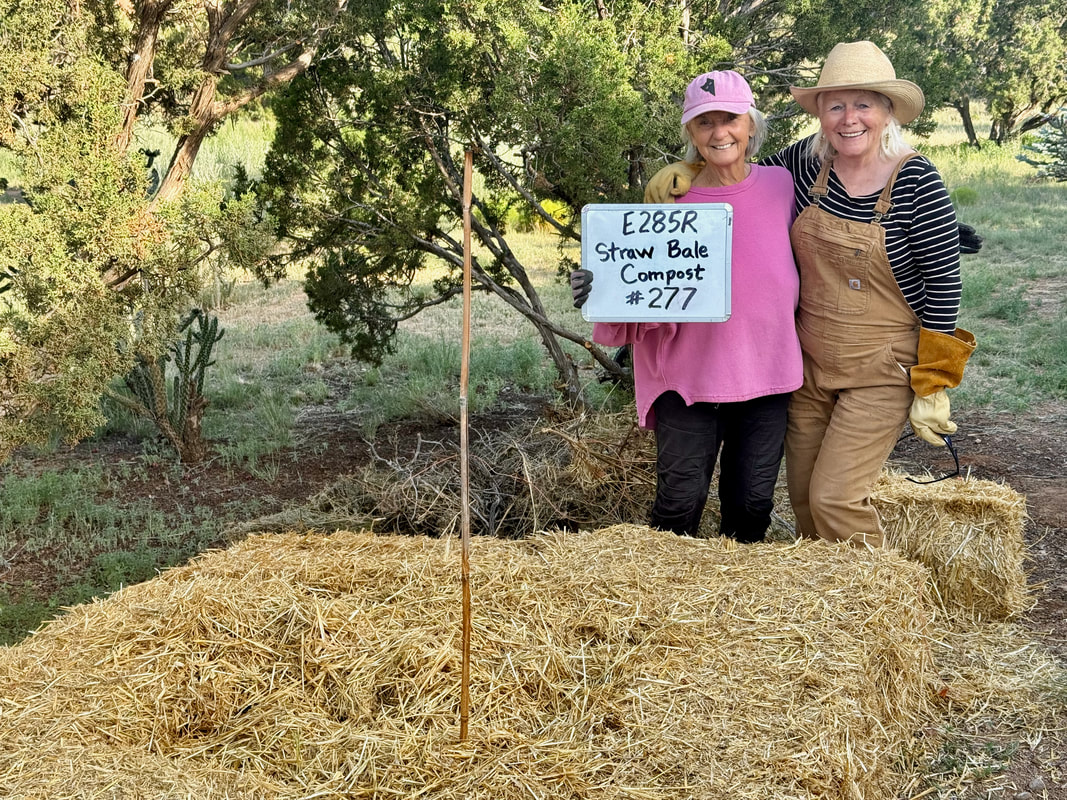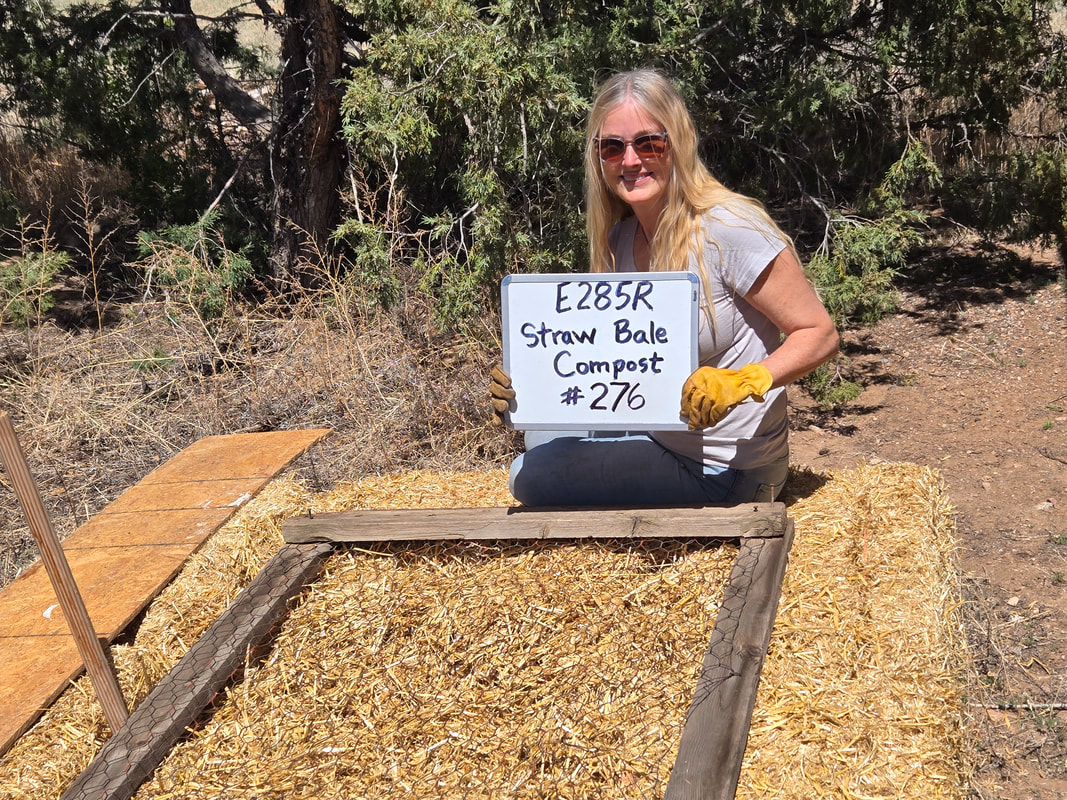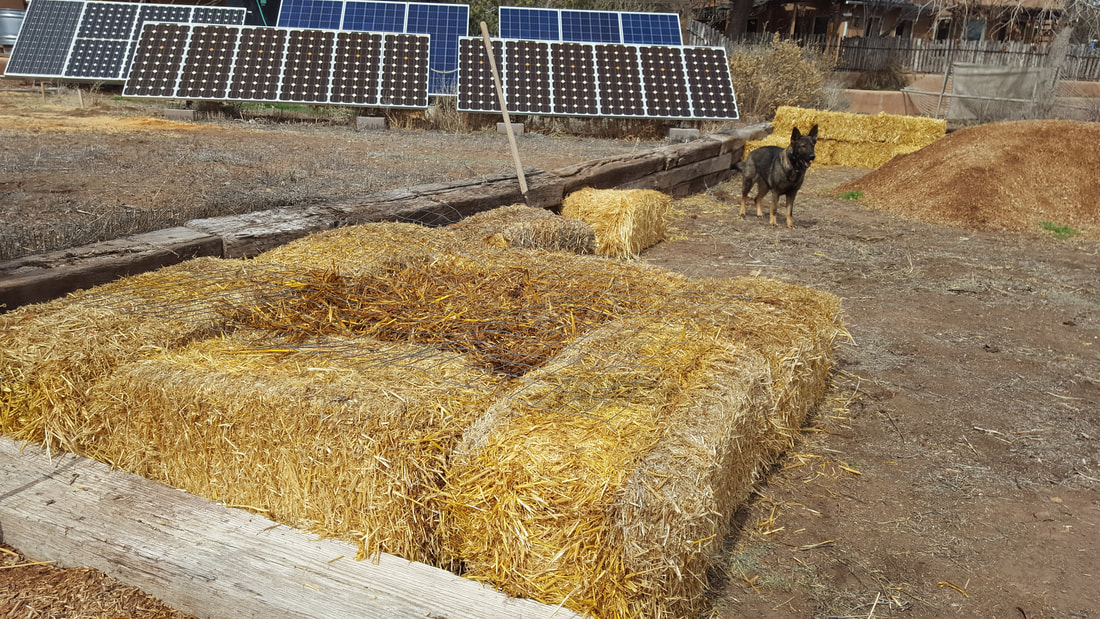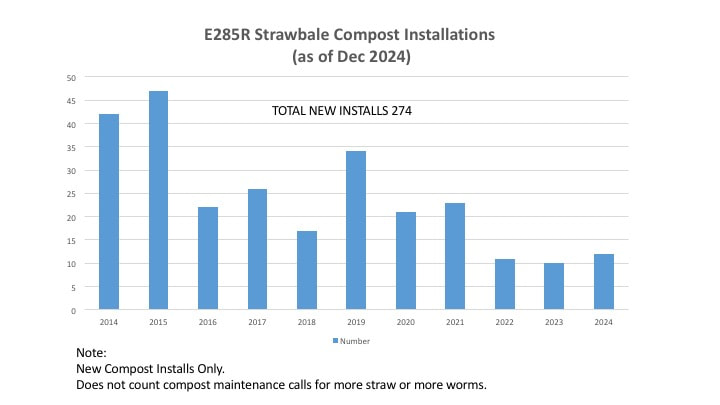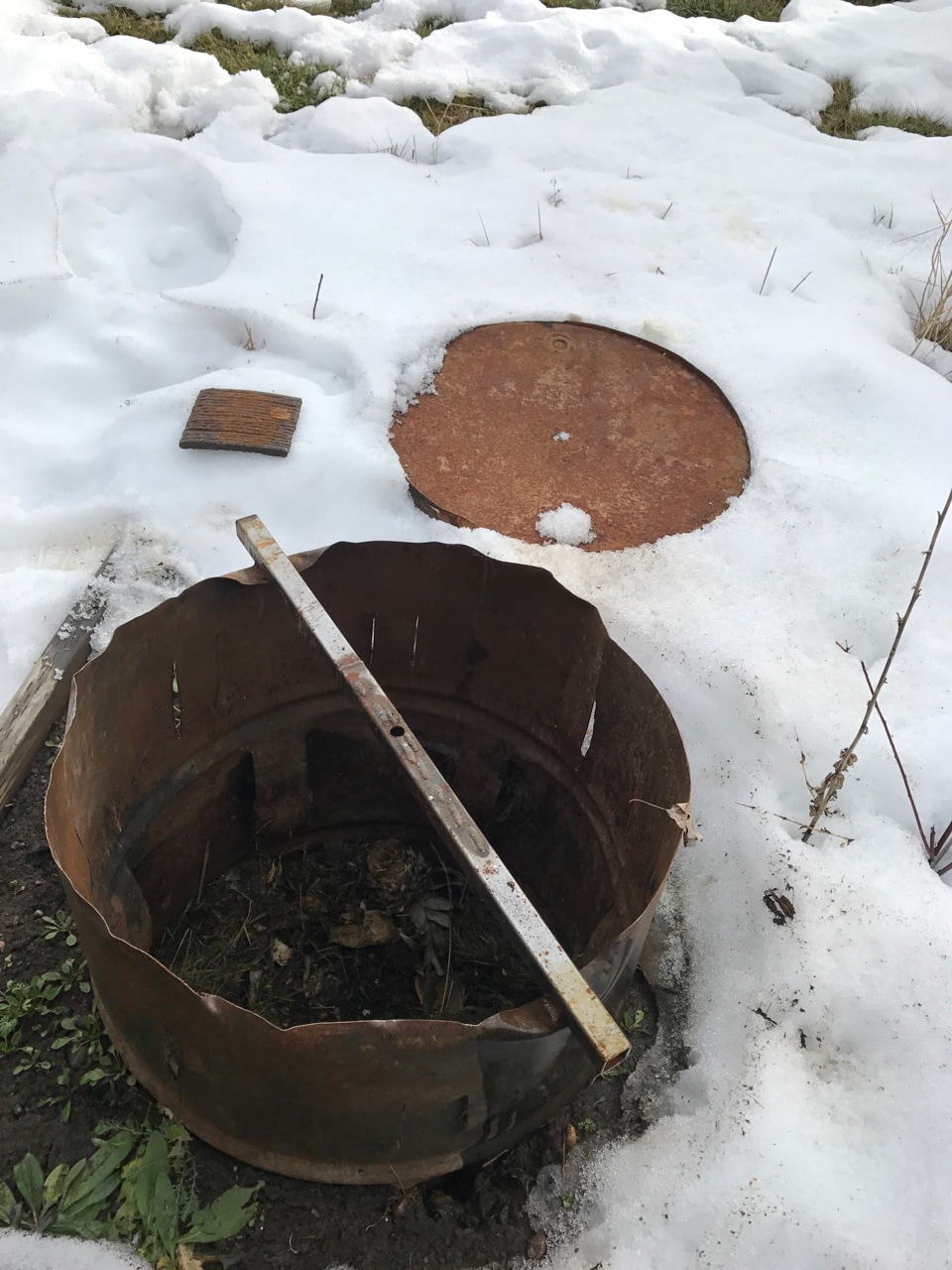LOCAL COMPOSTING MADE EASY
Because What You've Got Is Not Waste!
2024 - The United States discards more food than any other country in the world: nearly 60 million tons — 120 billion pounds — every year. That’s estimated to be almost 40 percent of the entire US food supply, and equates to 325 pounds of waste per person.
|
TOO GOOD TO WASTE - A few tunes on the subject by Chris Harrell "CURIOUS CHRIS, THE SINGING SCIENTIST," SHARES HIS COMPOST & RECYCLING SONG! Audio versions:"Composters!" "Poo! Poo! Poo!" "The Worms Crawl In, the worms Crawl Out" All rights reserved  Young composter ready for the worms. Young composter ready for the worms.
Eldorado/285 Recycles promotes composting to reduce landfill waste and to produce vital soil nutrients. Over 200 straw bale compost systems have been installed in the Eldorado/285 area. There are many ways to compost, but we prefer using worms, since the worms do all the work. If you are interested in composting in your yard, read the information below and contact Chris Harrell at clharrell505@gmail.com (575) 749-1249. To see a worm install, click here.
Why Compost? Organic materials, such as food scraps and yard waste, make up 30-40%, by weight, of Municipal Solid Waste (MSW). Composting organics provides great gardening compost; saves landfill space, extending landfill life, and is an aerobic process releasing carbon dioxide. On the other hand, landfill decomposition of organic waste is an anaerobic process releasing carbon as methane, a greenhouse gas 25 times more powerful than carbon dioxide. How to do it? Bacteria, Fungi and worms turn organic matter into compost. They need the same things all living creatures do: air, water, and food -- your kitchen scraps and yard trimmings. In our dry and often windy climate, moisture is the component most often in short supply, so keeping your compost pile moist is important. Here is a simple method of building a well-insulated, moist, compost pile. Creating the Enclosure 1. Select an area about 8’ x 8’ on a level area conveniently reached from your kitchen door, with a water source nearby. 2. Purchase seven standard small (about 36”x18”x15”) straw (not hay) bales (current price of a bale is $8.50), and arrange two on each side, and one in between, as shown here. This gives you an enclosed area about 3’ long x 3’ wide x 15” deep. Other sizes can be constructed as desired. The extra bale is for loose straw. Eldorado/285 Recycles has bales available for pickup in Eldorado or you can request delivery for a $10 fee. Members of Eldorado/285 Recycles are available to haul the bales and set them up for you. At that time we provide detailed instructions on system maintenance. 3. At installation we will prepare the system with a 6-10 inch layer of loose straw, which is thoroughly wet down. Tucked into the straw is your kitchen waste plus garden waste/yard trimmings. Finally we add red wriggler worms and a thick layer of loose straw. This reduces water loss and eliminates flies. Maintaining the pile 4. Add some water to your kitchen scrap container before adding the material to the pile. Water the pile, perhaps once a month in hot weather, if needed to maintain moisture. 5. Cover the pile with a layer of loose straw to reduce water loss. The worms will now do the work. All they need is food and water! We offer followup service to answer questions and provide advice. After about four months, you will be ready to harvest. How to harvest your Vermicomposter using Screens: Easy and fast: View this video! Purchase screens here: http://www.wormsetc.com/webstore/ What can I put in the pile?
Enrich the soil naturally.
What to do with extra food scraps during the winter.
If you have a larger compost system in the yard, place extra scraps there. Or, you might cut the bottom of a 30 gallon black storage tub and nestle it down a few inches into the soil. Toss in a few worms and extra food scraps, replace the lid and secure the lid with a rock. In late spring you will have fantastic compost for use in the garden. Where can I get more worms? Locally: Sam McCarthy Paynes Nurseries 6037 Agua Fria Santa Fe sam@paynes.com (505) 424-0336 Or on-line: Uncle Jim's Worm Farm Excellent worm FAQ: https://unclejimswormfarm.com/faqs/ Worm install movie (see how we setup a vermicomposter) Worm install slide show 1 Worm install slide show 2 (alt/option click on slideshow links to download) How much compost should I use? |
WHY vermicompost is so wonderful for your garden:
Worm castings are the richest natural fertilizer known to humans. That's right: as little as a tablespoon of pure worm castings provides enough organic plant nutrients to feed a 6" potted plant for more than two months. Worm castings stimulate plant growth more than any other natural product on the market. Unlike animal manure and artificial fertilizers it is absorbed easily and immediately by plants. But Worm Castings don't only stimulate plant growth: they also enhance the ability of your soil to retain water (because of its texture), and it even inhibits root diseases such as root rot. Worm Castings contain a highly active biological mixture of bacteria, enzymes, remnants of plant matter and animal manure, as well as earthworm cocoons (while damp). The castings are rich in water-soluble plant nutrients, and contain more than 50% more humus than what is normally found in topsoil. See more at: https://www.tastefulgarden.com/
Worm Castings for Your Garden by RGRAHAM33
What are worm castings and why are they important? Let’s start with a definition. Worm castings are simply undigested material, soil and bacteria deposited by a worm. There’s even a word for it: vermicompost. Vericompost means organic material that has been composted by worms. In other words, worm manure. Why are worm castings important for the home gardener? For one, they are biologically safe, contain no pathogens and are an excellent alternative to chemical fertilizers. For another, they can increase your garden’s yield by as much as 25%. Most important, perhaps, is that worm castings supply enzymes necessary to sustain healthy gardens.
Edward Howell writes in Enzyme Nutrition (1985) that, “Scientists are now measuring the value of a soil by the amount of enzymes it contains. These enzyme values have a direct relationship to the quality of our nutrition and health. It is known that the operation of microorganisms in the soil is very important to the growth of plants. The world is commencing to awaken to the importance of enzymes in the life of the soil, that is to say, the biological activity of the soil. A plant, like an animal, needs enzymes to prosper.”
Some of the most common castings are produced by meal worms, white worms and red wigglers. The castings may seem expensive at first but know that what you purchase is a very concentrated fertilizer. A little goes a long way. Robin and I use them as a top dressing for our tomatoes and pepper plants and are very pleased with the results.
Worm castings are the richest natural fertilizer known to humans. That's right: as little as a tablespoon of pure worm castings provides enough organic plant nutrients to feed a 6" potted plant for more than two months. Worm castings stimulate plant growth more than any other natural product on the market. Unlike animal manure and artificial fertilizers it is absorbed easily and immediately by plants. But Worm Castings don't only stimulate plant growth: they also enhance the ability of your soil to retain water (because of its texture), and it even inhibits root diseases such as root rot. Worm Castings contain a highly active biological mixture of bacteria, enzymes, remnants of plant matter and animal manure, as well as earthworm cocoons (while damp). The castings are rich in water-soluble plant nutrients, and contain more than 50% more humus than what is normally found in topsoil. See more at: https://www.tastefulgarden.com/
Worm Castings for Your Garden by RGRAHAM33
What are worm castings and why are they important? Let’s start with a definition. Worm castings are simply undigested material, soil and bacteria deposited by a worm. There’s even a word for it: vermicompost. Vericompost means organic material that has been composted by worms. In other words, worm manure. Why are worm castings important for the home gardener? For one, they are biologically safe, contain no pathogens and are an excellent alternative to chemical fertilizers. For another, they can increase your garden’s yield by as much as 25%. Most important, perhaps, is that worm castings supply enzymes necessary to sustain healthy gardens.
Edward Howell writes in Enzyme Nutrition (1985) that, “Scientists are now measuring the value of a soil by the amount of enzymes it contains. These enzyme values have a direct relationship to the quality of our nutrition and health. It is known that the operation of microorganisms in the soil is very important to the growth of plants. The world is commencing to awaken to the importance of enzymes in the life of the soil, that is to say, the biological activity of the soil. A plant, like an animal, needs enzymes to prosper.”
Some of the most common castings are produced by meal worms, white worms and red wigglers. The castings may seem expensive at first but know that what you purchase is a very concentrated fertilizer. A little goes a long way. Robin and I use them as a top dressing for our tomatoes and pepper plants and are very pleased with the results.
What about your Worms in winter?
Proof that worms survive and thrive in winter!
Intrepid Bozeman composting worms muscle through coldest Montana winter since 1979: "They're doing great" according to Taran and his roommates, Peter and Dirk. With January temps dropping below minus 30, and more than two feet of snow, the worms, at home in their recycled, 50 gallon oil drum, were unfazed. Peter set up their system last summer and the worms just keep chowing down - no worries. See their photo's below:
Proof that worms survive and thrive in winter!
Intrepid Bozeman composting worms muscle through coldest Montana winter since 1979: "They're doing great" according to Taran and his roommates, Peter and Dirk. With January temps dropping below minus 30, and more than two feet of snow, the worms, at home in their recycled, 50 gallon oil drum, were unfazed. Peter set up their system last summer and the worms just keep chowing down - no worries. See their photo's below:
Eldorado Stable Amenity: Manure and the Gardener - A Match made in Heaven
“Matching barn owners who have clean manure with gardeners who want compost!”
Contact the chair of the ECIA Stable Committee, Lisa Bessone info@eldoradosf.org, to participate in our ECIA Gardener/Barn Owner matchmaking program, which makes it easy to get manure for compost how and when you want it.
More information in the PDF below (click to download).
Contact the chair of the ECIA Stable Committee, Lisa Bessone info@eldoradosf.org, to participate in our ECIA Gardener/Barn Owner matchmaking program, which makes it easy to get manure for compost how and when you want it.
More information in the PDF below (click to download).
| esc_manure_matchmaking__2019.pdf | |
| File Size: | 298 kb |
| File Type: | |
